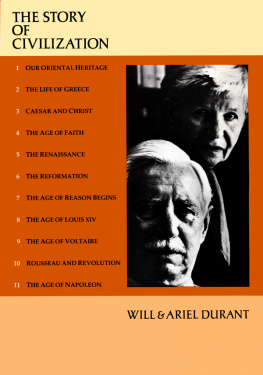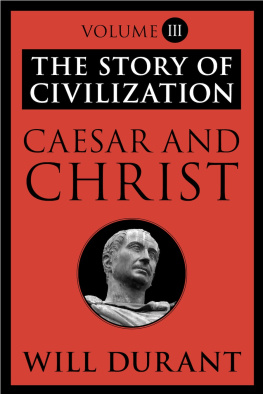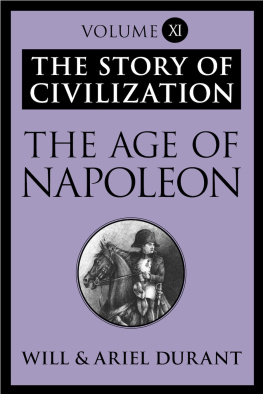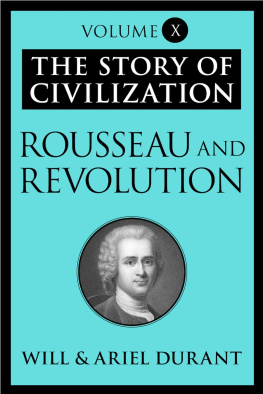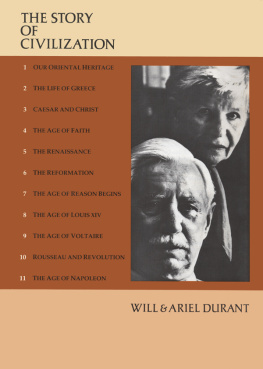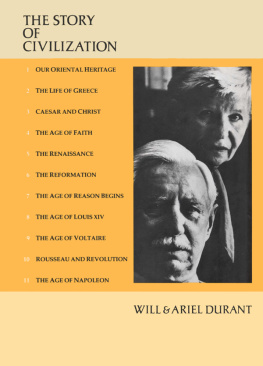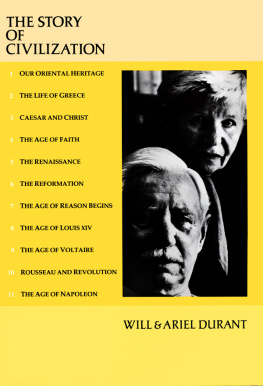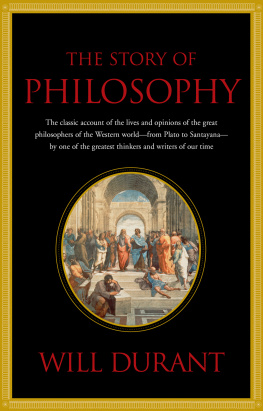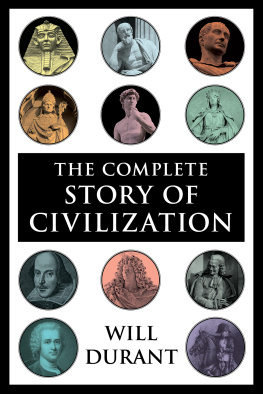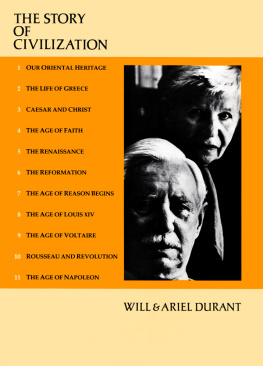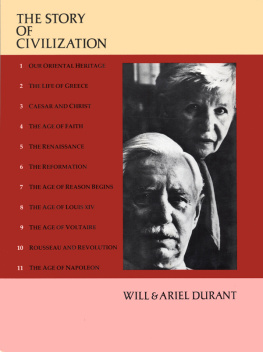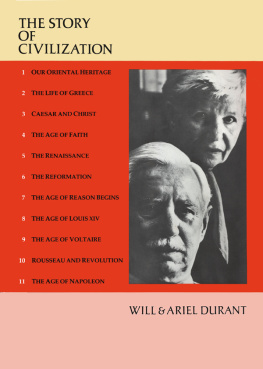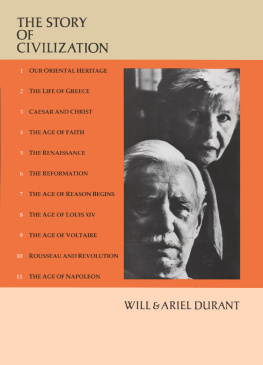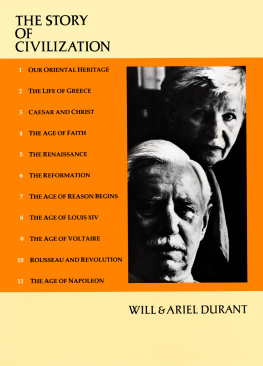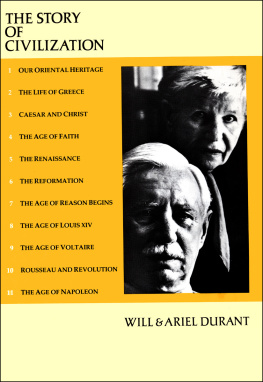
BY WILL DURANT
The Story of Philosophy
Transition
The Pleasure of Philosophy
Adventures in Genius
BY WILL AND ARIEL DURANT
T HE S TORY OF C IVILIZATION
1. Our Oriental Heritage
2. The Life of Greece
3. Caesar and Christ
4. The Age of Faith
5. The Renaissance
6. The Reformation
7. The Age of Reason Begins
8. The Age of Louis XIV
9. The Age of Voltaire
10. Rousseau and Revolution
11. The Age of Napoleon
The Lessons of History
Interpretation of Life
A Dual Autobiography
COPYRIGHT 1965 BY WILL AND ARIEL DURANT
ALL RIGHTS RESERVED
INCLUDING THE RIGHT OF REPRODUCTION
IN WHOLE OR IN PART IN ANY FORM
PUBLISHED BY SIMON AND SCHUSTER
A DIVISION OF GULF & WESTERN CORPORATION
SIMON & SCHUSTER BUILDING
ROCKEFELLER CENTER, 1230 AVENUE OF THE AMERICAS
NEW YORK, N.Y. 10020
www.SimonandSchuster.com
SIMON AND SCHUSTER AND COLOPHON ARE TRADEMARKS
OF SIMON & SCHUSTER
ISBN 0-671-01325-4
ISBN 978-1-4516-4766-2 (eBook)
LIBRARY OF CONGRESS CATALOG CARD NUMBER 6511161
TO OUR BELOVED
GRANDSON
JIM
Apology
B LAME for the length of this volume must rest with authors fascinated to exuberant prolixity by the central themethat pervasive and continuing conflict between religion and science-plus-philosophy which became a living drama in the eighteenth century, and which has resulted in the secret secularism of our times. How did it come about that a major part of the educated classes in Europe and America has lost faith in the theology that for fifteen centuries gave supernatural sanctions and supports to the precarious and uncongenial moral code upon which Western civilization has been based? What will be the effectsin morals, literature, and politicsof this silent but fundamental transformation?
The scale of treatment in each volume has grown with the increasing number of past events and personalities still alive in their influence and interest today. This and the multiplicity of topicsall aspects of civilization in Western Europe from 1715 to 1756may offer some excuse for the proliferation of the tale. So The Age of Voltaire has burst its seams, and spills over into a contemplated Part X, Rousseau and Revolution, which will carry the story to 1789. This will look at the transformation of the world map by the Seven Years War; the later years of Louis XV, 175674; the epoch of Johnson and Reynolds in England; the development of the Industrial Revolution; the flowering of German literature from Lessing to Goethe, of German philosophy from Herder to Kant, of German music from Gluck to Mozart; the collapse of feudalism in the France of Louis XVI; and the history of those peripheral nationsSweden, Denmark, Poland, Russia, Turkey, Italy, Portugal, Spainwhich have been deferred from this volume partly to save space, and as not directly involved (except through the papacy) in the great debate between reason and faith. This final volume will consider the later phases of that debate in the revolt of Rousseau against rationalism, and the heroic effort of Immanuel Kant to save the Christian theology through the Christian ethic. The perspective of the age of Voltaire will be completed in that Part X of The Story of Civilization. The epilogue to the present volume reviews the case for religion; the epilogue to Rousseau and Revolution, surveying all ten volumes, will face the culminating question: What are the lessons of history?
We have tried to reflect reality by combining history and biography. The experiment will legitimately invite criticism, but it carries out the aim of integral history. Events and personalities go hand in hand through time, regardless of which were causes and which were effects; history speaks in Let us follow that living flame through his century.
ACKNOWLEDGMENTS
The manuscript has had the advantage of being read by Dr. Theodore Bester-man, Director of the Institut et Muse Voltaire in Geneva; we thank him for his patience, and for opening to us his great collection of Voltaireana. He found one serious error in our text, but otherwise voted us a very high degree of accuracy. Doubtless some errors still remain. We shall welcome all corrections that are tempered with mercy.
Our warm appreciation to Sarah and Harry Kaufman for their help in classifying the material, and to our grandson, James Easton, for revising the chapter on the history of science. Our daughter Ethel not only typed the manuscript but improved it by her suggestions. And we have had again the benefit of expert and scholarly editing of the text, the notes, and the index by Mrs. Vera Schneider.
NOTES ON THE USE OF THIS BOOK
1. Dates of birth and death will be found in the Index.
2. Voltaire reckoned a 50 per cent depreciation of French currency between 1640 and 1750. The general reader may use the following rough equivalents, as between 1750 and 1965, in terms of the currency of the United States of America:
crown, $6.25
ducat, $6.25
cu, $3.75
florin, $6.25
franc, $1.25
guilder, $5.25
guinea, $26.25
gulden, $5.25
livre, $1.25
louis dor, $25.00
mark, $16.67
penny, $.10
pound, $25.00
shilling, $1.25
sou, $.0625
thaler, $4.00
3. The location of works of art, when not indicated in the text, will usually be found in the Notes. In allocating such works, the name of the city will imply its leading gallery, as follows:
AmsterdamRijksmuseum
BerlinStaatsmuseum
BolognaAccademia di Belle Arti
BudapestMuseum of Fine Arts
ChicagoArt Institute
CincinnatiArt Institute
ClevelandMuseum of Art
DetroitInstitute of Art
DresdenGemlde-Galerie
DulwichCollege Gallery
EdinburghNational Gallery
FrankfurtStdelsches Kunstinstitut
GenevaMuse dArt et dHistoire
The HagueMauritshuis
Kansas CityNelson Gallery
LeningradHermitage
LondonNational Gallery
MadridPrado
MilanBrera
NaplesMuseo Nazionale
New YorkMetropolitan Museum of Art
ParisLouvre
San Marino, Calif.Henry E. Huntington Art Gallery
ViennaKunsthistorisches Museum
WashingtonNational Gallery
4. Passages in reduced type are especially dull and recondite, and are not essential to the general picture of the age.
Table of Contents
BOOK IV : THE ADVANCEMENT OF LEARNING
171589
BOOK V : THE ATTACK UPON CHRISTIANITY
173074
List of Illustrations
T HE page numbers in the captions refer to a discussion in the text of the subject or the artist, and sometimes both.
Part I. This section follows
Part II. This section follows page
Part III. This section follows page
Part IV. This section follows page
PROLOGUE
CHAPTER I
France: The Regency
171523
I. THE YOUNG VOLTAIRE : 16941715
H E was not yet Voltaire; till his release from the Bastille in 1718 he was Franois Marie Arouet. He was born in Paris on November 21, 1694, and became its distilled essence till 1778. His presumptive father, Franois Arouet, was an affluent attorney, acquainted with the poet Boileau and the courtesan Ninon de Lenclos, whose wills he wrote, and with the dramatist Pierre Corneille, whom he described as the most boring mortal he had ever met. The mother, Marie Marguerite Daumard, was of slightly noble lineage, daughter of an official of the Parlement, and sister of the comptroller general of the royal guard; through them she had access to the court of Louis XIV. Her vivacity and sprightly wit made her home a minor salon. Voltaire thought she possessed all the intellect in his parentage, as his father had all the financial skill; the son absorbed both of these gifts into his heritage. She died at the age of forty, when he was seven. Of her five children the eldest was Armand, who adhered zealously to the Jansenist theology and the patrimonial property. Franois Marie, the youngest child, was so sickly in his first year that no one believed he could survive. He continued till his eighty-fourth year to expect and announce his early death.
Next page
